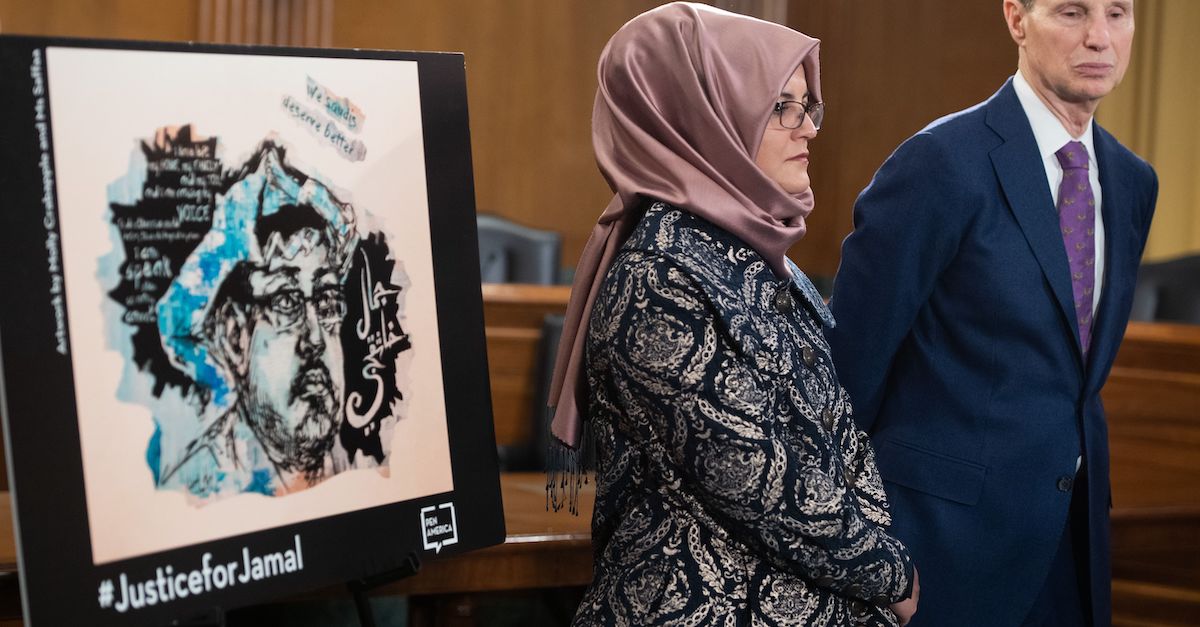
It’s been more than two years since journalist and Saudi Arabian dissident Jamal Khashoggi, 59, walked into the Saudi Consulate in Istanbul, Turkey and never walked out. Khashoggi, then a U.S. permanent resident in exile from Saudi Arabia, was assassinated and his body was dismembered. Khashoggi’s fiancée Hatice Cengiz filed a lawsuit in U.S. federal court against Saudi Arabia’s Crown Prince Mohammed bin Salman (MBS) and everyone else that, Cengiz says, conspired to commit this “brutal,” “brazen,” and “ruthless torture and murder.”
“The ruthless torture and murder of Mr. Khashoggi shocked the conscience of people throughout the world. The objective of the murder was clear – to halt Mr. Khashoggi’s advocacy in the United States, principally as the Executive Director of Plaintiff DAWN [Democracy for the Arab World Now], for democratic reform in the Arab world,” the lawsuit began. “The murder was carried out pursuant to a directive of Defendant Mohammed bin Salman, the Crown Prince of Saudi Arabia. Defendants saw Mr. Khashoggi’s actions in the United States as an existential threat to their pecuniary and other interests and, accordingly, conspired to commit the heinous acts that are the subject of this suit.”
The civil lawsuit alleges 7 counts against at least 29 individuals, including MBS: Extrajudicial Killing under the Alien Tort Statute, Extrajudicial Killing under the Torture Victim Protection Act, Tortious Interference of Contract, Wrongful Death, Intentional Infliction of Emotional Distress, Loss of Consortium, Loss of Society.
Cengiz has mostly been identified in news reports as Khashoggi’s fiancée, but in the lawsuit there a distinction was made when identifying her as a plaintiff: Cengiz is the “widow of Jamal Khashoggi. Plaintiff Cengiz and Mr. Khashoggi were married in an Islamic ceremony on September 16, 2018. At the time of his murder, they were seeking to civilly confirm their marriage.” In other words, they were not legally married at the time of the murder.
The lawsuit claimed that MBS ordered the murder to “halt Mr. Khashoggi’s advocacy in the United States, principally as the Executive Director of Plaintiff DAWN, for democratic reform in the Arab world”:
The plan to permanently silence Mr. Khashoggi by murdering him was put in motion no later than the summer of 2018 after Defendant Mohammed bin Salman, other Defendants, and their co-conspirators discovered Mr. Khashoggi’s plans to utilize DAWN as a platform to espouse democratic reform and promote human rights. The Defendants learned, after hacking mobile telephone(s) of Mr. Khashoggi’s associate(s), that Mr. Khashoggi had created and headed DAWN, and Defendants were deeply concerned that Mr. Khashoggi’s activities through DAWN in the United States, including his calls for democracy and observance of human rights in the Kingdom of Saudi Arabia (the “Kingdom” or “Saudi Arabia”), would undermine Defendants’ pecuniary and political interests. Accordingly, Defendants resolved to put an end to Mr. Khashoggi’s efforts by any means necessary.
After changing its story on the killing, Saudi Arabia said that this was a premeditated murder.
MBS has neither admitted to ordering the Khashoggi murder nor to having advance knowledge of it. He did say, however, that “It happened under my watch and “I get all the responsibility because it happened under my watch.”
In Dec. 2019, Saudi Arabia sentenced five men to death for the murder, but the prosecution claimed the “the killing was not premeditated […] the decision was taken at the spur of the moment.” In Sept. 2020, the death sentences were commuted.
Khashoggi’s remains have never been found.
The plaintiffs seek a jury trial and damages in the U.S. District Court for the District of Columbia.
[Image via SAUL LOEB/AFP]